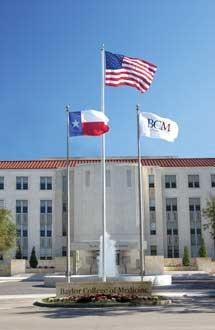
Dan L Duncan Comprehensive Cancer Center
Comprehensive Cancer Center
Pavan Reddy, M.D., Director
Houston, Texas
Main:
713-798-1354
The Dan L Duncan Cancer Center at Baylor College of Medicine formed in 2006 after a $100 million transformative gift from the late Dan L. Duncan. The National Cancer Institute designated the Duncan Cancer Center the following year in 2007. In 2015, the Duncan Cancer Center received comprehensive status from NCI for the breadth and depth of its research and its commitment to serve all Houstonians, making the Dan L Duncan Comprehensive Cancer Center one of only three comprehensive cancer centers in Texas. The Duncan Cancer Center has had marked increases in cancer research funding, from $99 million in 2007 to more than $170 million today. In addition, the center is a proud leader in community outreach, education, and reduction of health disparities in Texas.
The Duncan Cancer Center provides compassionate patient care and cutting-edge research through four hospital partners: Baylor St. Luke’s Medical Center, the Michael E. DeBakey Veterans Affairs Medical Center, Harris Health System’s Ben Taub Hospital, and Texas Children’s Hospital. Its mission is to reduce morbidity and mortality from cancer through research, education, and outreach into the community.
Research at Dan L Duncan Comprehensive Cancer Center
The Duncan Cancer Center is a world leader in the genomics and proteomics of cancer and pioneered the science that led to optimal hormonal therapies and other targeted therapies, as well as the immunotherapeutic treatment of cancer using CAR T cells. Investigators explore the interactions between the environment and genetics that lead to cancer, and through this science, they identify new targets for the development of novel drugs and biomarkers. The Duncan Cancer Center has enrolled more than 5,400 patients into clinical trials since 2007. Investigators are saving lives and improving care through innovative studies in adoptive T-cell immunotherapy, precision medicine, and de-escalation of treatment of breast and other cancers. Research programs include: Breast Cancer; Cell and Gene Therapy; Pediatric Cancer; Nuclear Receptor; Transcription and Chromatin Biology; Mechanisms in Cancer Evolution; Cell Signaling and Metabolism; and Cancer Prevention and Population Sciences. The center is home to three Specialized Programs of Research Excellence (SPOREs) grants from NCI in breast cancer, lymphoma, and a shared SPORE with the University of Texas MD Anderson Cancer Center on glioma.
Select Scientific Initiatives at Dan L Duncan Comprehensive Cancer Center
In a collaborative pilot with the Cancer Prevention and Population Sciences Program, the Mechanisms in Cancer Evolution Program, the Center for Precision Environmental Health, and the Oregon Health and Science University, the Duncan Cancer Center responded within a few days of the Hurricane Harvey catastrophe to provide funding to purchase silicone wrist bands to be worn by flood victims. The wristbands passively measured exposures to the 1,500 toxic chemicals, carcinogens, and endocrine disruptors that could have immediate and long-term effects on health, including cancer.
The center is also focused on initiatives that will likely alter medical practice. One project resulted from a collaboration in the Center for Cell and Gene Therapy program between basic scientists and clinicians. Patients posttransplant are at high risk for several potentially lethal viral infections. This group employed multivirus-specific T cells posttransplant and achieved a 92% response rate. In another project with implications for clinical treatment, the Breast Cancer Program showed that many patients with human epidermal growth factor 2 (HER2)–positive breast cancer may not need chemotherapy but can be treated with targeted therapy alone. Biomarkers to select the best patients for this strategy are now under development.